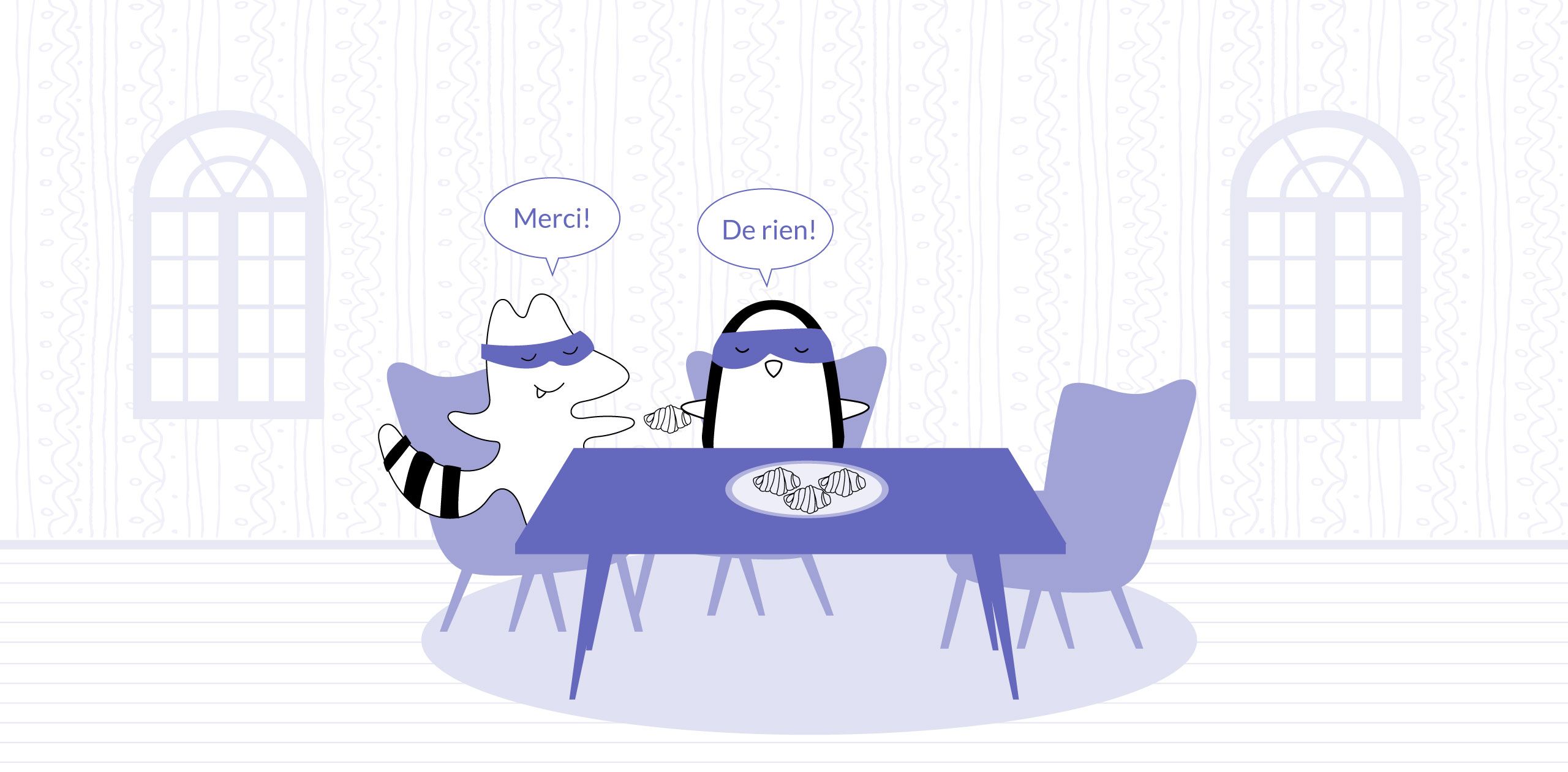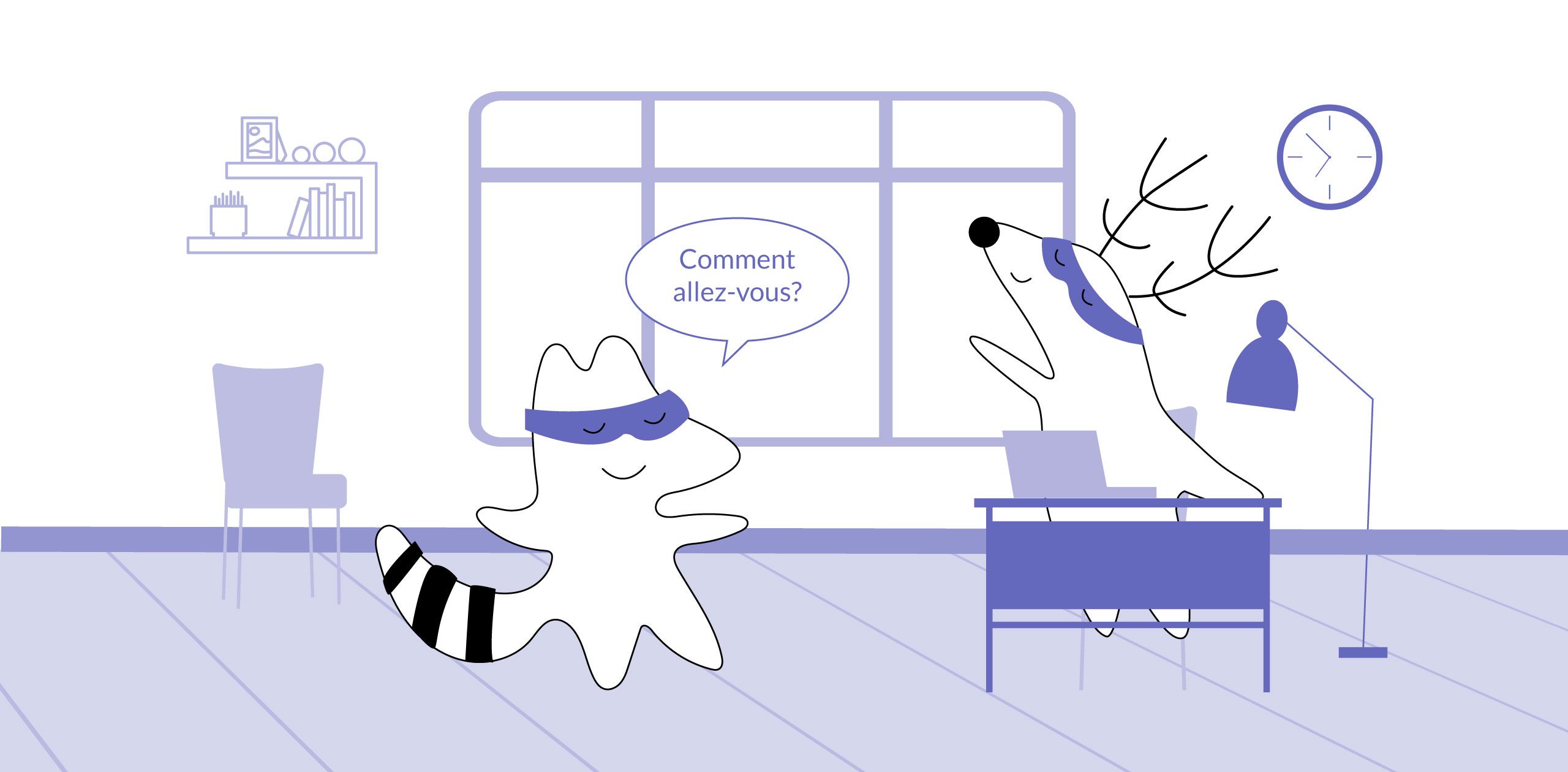
Now that you have already mastered how to say “hello,” “goodbye,” and “yes,” in French, let’s move on to the small talk. Knowing how to ask “how are you?” in French will allow you to communicate better with your French friends and meet new people.
Just like the other French expressions we have covered, this one is not as simple as it might seem. Depending on the situation and your intention, there are at least 15 phrases you can use to ask a person how they are.
You also need to know which one to use when. Otherwise, you might hear a simple Bien, merci in response, even if you genuinely wanted to hear about your French friend’s weekend.
However, as you’re just a beginner, you don’t need to know all possible phrases. So today, we are going to tell you about the five most useful ways to say “How are you?” in French. You can use these in different situations, including at home, at work, and at a party.
Learn French with Langster
The Classic One: Comment Allez-Vous ?
This is one of the most common ways to ask someone “how are you?” in French, and it’s one of the first expressions you will learn in any French class. It’s simple, safe, and polite - so you can use it in almost any situation.
Comment allez-vous ? is literally translated as “how are you going?” In French, the verb “to be” is never used when asking about someone’s day - aller (to go) is used instead.
Also, note that when you use “vous” when talking to someone in French, your tone of speech immediately gets formal. So this expression, for example, will be useful in conversations with your boss - but not in informal French settings unless you’re talking to a group of people.
Less Formal Alternative - Comment Vas-Tu ?
If you don’t like the formality of comment allez-vous, you can switch the pronoun to say Comment vas-tu ? instead. This phrase is less formal than Comment allez-vous ? but it won’t be completely casual. The difference is the same as between "How are you?" and "How are you doing" in English.
Both the phrases use inversion to ask the question. This method is considered formal in French. Nevertheless, as you use “tu” with this phrase, you’re somewhere between formal and informal French.
Because of this, Comment vas-tu might sound a little awkward. Many people, both native speakers and French learners, prefer to avoid it. However, it’s useful for people you see frequently but aren’t close to. For example, if you’re talking to a colleague at work or a person who’s a close acquaintance but not a friend. For casual settings with close friends or family, some better expressions exist.
Grammar
Both these phrases and some other expressions on our list use inversion, which is one of the basic methods to turn a phrase into a question. And it’s not as challenging as it might seem to be: you simply invert the conjugated verb and subject pronoun and join them with a hyphen. Like that: vous allez → allez-vous ?
Another thing these expressions might help you master is the conjugation of the verb aller (to go). You can find all the conjugations in our app, but let us quickly remind you about this one:
| je | vais | nous | allons |
| tu | vas | vous | allez |
| il, elle, on | va | ils, elles | vont |
| je | vais | nous | allons |
| tu | vas | vous | allez |
| il, elle, on | va | ils, elles | vont |
Pronunciation
When it comes to the pronunciation of these two phrases, they might be challenging for beginners because of the nasal quality of the word “comment.” (Remember about the -ent suffix?) Also, because “aller” starts with a vowel, a liaison will occur - so when using the first phrase, you’ll say something like coman~ talleh voo?
With the second phrase, it will be a little easier: coman~ va tu? However, don’t rely only on these online phonetic spellings. Check the original French pronunciation:
French
English
Comment allez-vous ?
How are you doing? (formal)
Comment vas-tu ?
How are you doing? (less formal)
The Friendly One: Comment Ça Va ?
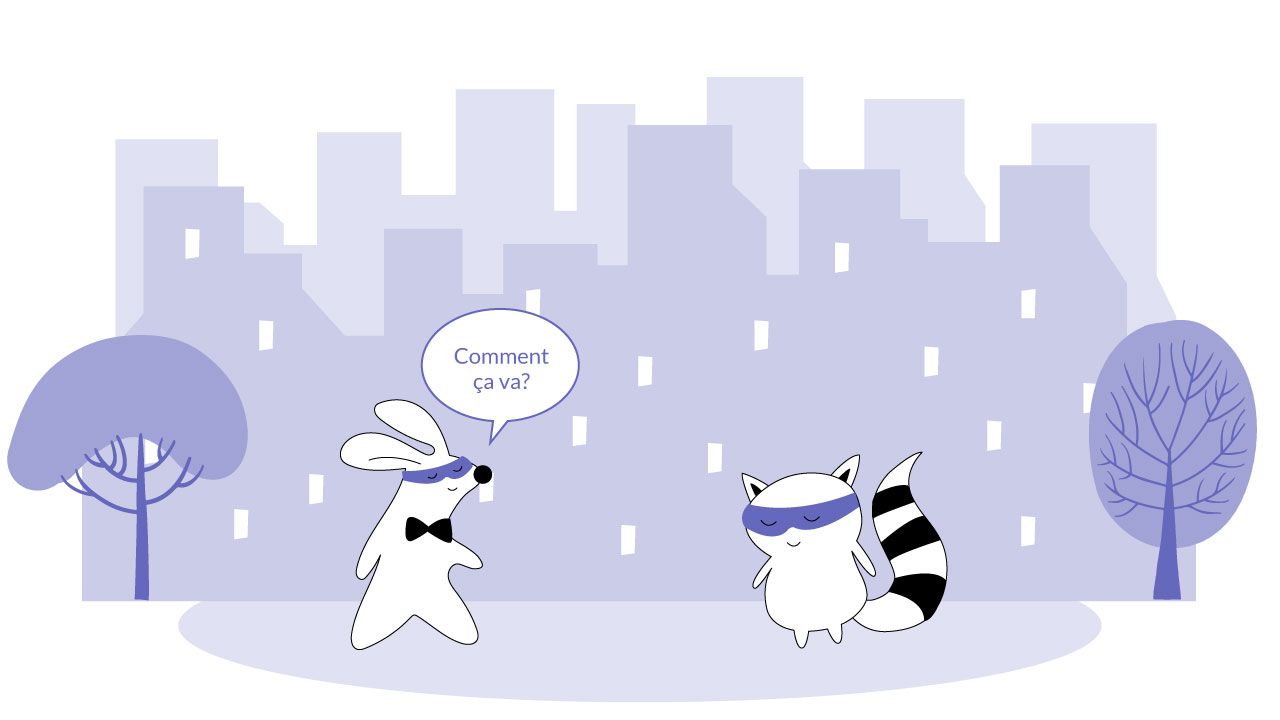
This is a universal phrase that you will hear all the time. You can use it in different situations - for example, when greeting someone in the street or if you want to say “good morning” to your neighbor. We have already covered it in a few articles (for example, this one), but let’s have a quick reminder.
Comment ça va ? uses inversion as well, but it’s not as formal as any of the phrases we covered above. It’s definitely a safe bet for when you’re not sure what level of formality is required. It’s most often used among friends and family members.
Informal Alternative - Ça Va ?
If you want to sound more casual, or if you simply don’t like how long the phrase Comment ça va ? is, you can use the shorter version - ça va ? French people love deleting words and letters as they speak, especially in informal situations, and here you have a perfect example.
Ça va ? can also be used in place of the French greeting - in that case, it doesn’t really show your desire to learn about someone’s life. Instead, you can expect to hear a short answer to it - ça va or ça va bien (something like “everything’s fine”).
Grammar and Pronunciation
Both those phrases can be literally translated as “how’s it going?” or “it’s going?” - and here you see the same usage of the verb “to go” as before.
However, in this case, the pronoun “ça” is added - and it simply means “that” or “it.”
When it comes to pronunciation, it’s the “ç” letter you need to look out for. The little hook on the letter is called cédille (or cedilla) and is used to add softness to the sound - so you pronounce it like s. If it wasn’t for cédille, you would have to say not sa, but ka, as in the word “car.”
French
English
Comment ça va ?
How's it going? (formal)
Ça va ?
How's it going? (informal)
The Empathic One: Comment Vous Sentez-Vous ?
This is a non-traditional way to ask “how are you” in French. Literally translated as “how are you feeling?”, it can be used in more emotional situations when you want to show concern - for example, after an exam, when someone is ill, or before an important presentation at work.
Just like other “vous” phrases on our list, this one is formal - so you can use it, for example, at work or at school. You can also use “vous” when talking to more than one person.
French
English
Comment vous sentez-vous ?
How are you feeling? (formal)
Friendly Alternative - Comment Tu Te Sens?
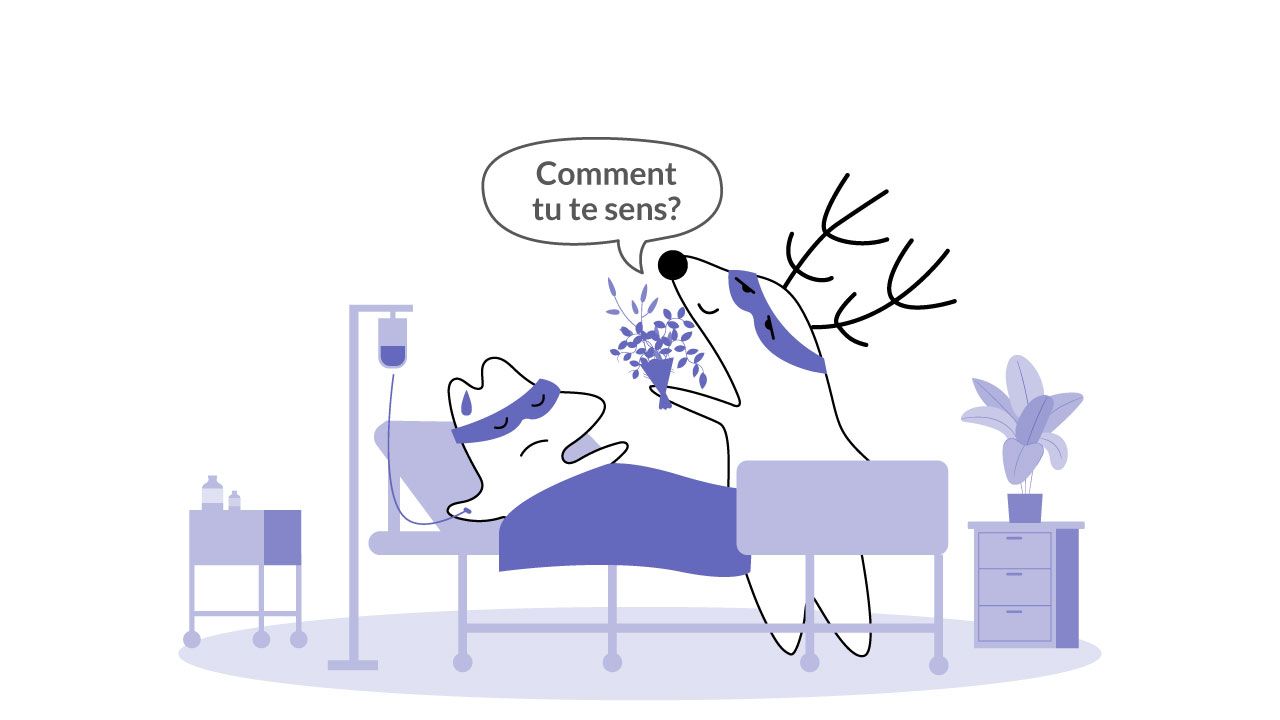
If you find yourself in a more casual situation, or if you are talking to just one friend or close acquaintance, use “Comment tu te sens ?” This phrase will serve you well if you want to show how concerned you are about the situation.
Just like the other phrases that begin with “comment”, this one doesn’t allow your friend to simply answer with “bien” - it requires a deeper answer.
French
English
Comment tu te sens ?
How are you feeling? (informell)
The Casual One: Quoi De Neuf ?
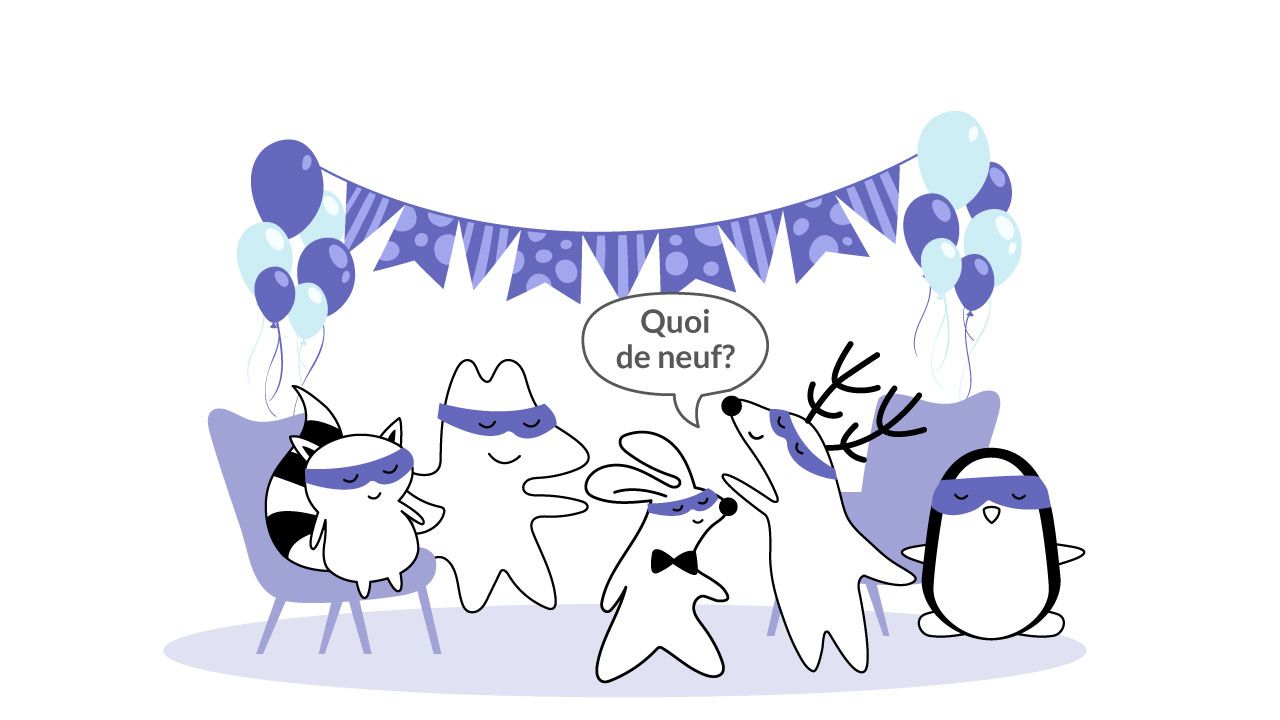
This casual phrase can often be used to ask someone how it's going or how things are. It literally translates as “what’s new?” - but it’s often used in place of the English “what’s up?”
French
English
Quoi de neuf ?
What's new?
When to use it? Not in formal situations, so don’t say it at work. It’s one of the most commonly used casual expressions, though - so feel free to stick to it when you want to say “how are you?” in French to close friends or siblings.
The Fun One: Ça Roule ?
Just like the quoi de neuf, you shouldn’t use this one in formal situations - otherwise, you might sound rude. This is a super informal way of asking “how are you” in French, which literally translates as “is it rolling?” (Is everything going smoothly?)
Most often, you will use it to ask about a specific situation - for example, your friend’s preparation for the wedding or their new job.
French
English
Ça roule ?
What's up?
You can also add “ma poule” to the phrase, so that it will sound more fun: Ça roule, ma poule ? Don’t worry about the translation - while “ma poule” literally means “my chick,” in this phrase, it will be something more like “What’s up, dude?”
How to Respond to “How Are You?” In French?
Of course, depending on the question and formality of the situation, you can answer “how are you?” in French in different ways. Nevertheless, there are some common responses you can use both in formal and informal situations. Take a look:
Formal
Bien, Merci !
French
English
Bien, merci !
Good, thank you!
This is the most common response to “how are you” in French, regardless of the question. It literally means “good, thank you” - and can be used in formal and casual settings. So whether someone asked Comment allez-vous ? or Ça va ?, you can answer with bien, merci.
And you can also add “très”(very) to the front to give it a little twist and say Très bien, merci (very well, thanks).
Assez bien
French
English
Assez bien.
Quite well.
This is an alternative to “très bien” or simply “bien”, and it means “well enough” or “quite well.” Just like the first one, it’s relatively positive and can be used in both formal or informal situations.
Tout va bien
French
English
Tout va bien.
All good.
“All good” is another expression you can use to say that everything’s going well. It’s a useful phrase in a situation when you don’t know how formally you need to respond - whether at work, at the mall, or at a family gathering.
Just twist it
You can also add Et tu ? (and you?) to the ending to turn the conversation around and keep it rolling. In formal situations, use et vous ? to sound polite.
French
English
Et tu ? / Et vous ?
And you?
Informal
Ça va
French
English
Ça va.
Okay.
You will most often hear this in response to Ça va ? or Comment ça va ?, and it can be used with other “how are you’s.” It’s simple, it’s straight to the point, and it’s really easy to pronounce. No wonder people who are just starting their journey with the French language love it.
Comme ci, comme ça
French
English
Comme ci, comme ça.
So-so.
Unlike other responses you’ve already learned, this one is not fully positive. Literally translated as “like this, like that”, it’s more of an “okay” or “so-so.” It’s also a pretty casual way to answer someone - so avoid using it when talking to your boss.
Ça roule
French
English
Ça roule.
Everything's good.
Just like “ça va”, this expression can be used as a response to the question that sounds the same. Basically, you say “everything’s rolling” or “everything’s good” in a casual way. Just remember that both the question and the answer are generally used in regard to a certain situation, not your overall life.
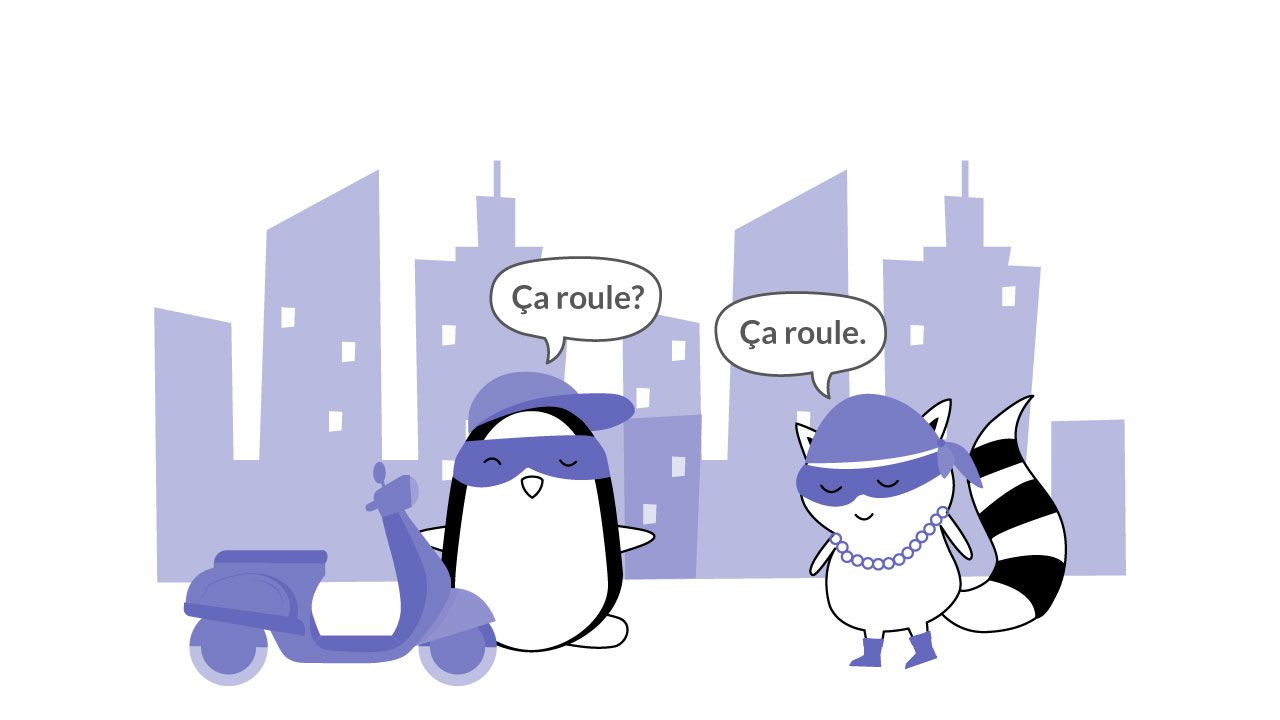
Final Thoughts
These are just a few ways to ask “how are you?” in French and respond to the question. As you might already know, French people don’t stick to just one or two expressions in their daily life. Depending on the situation, company, and mood, they will use different phrases - from Comment allez-vous ? to Ça roule, ma poule ?
In some time, you will do the same. However, you don’t need to start using all of the expressions mentioned in this article immediately. In the beginning, learn two or three of them and start incorporating them into your French conversations right away.
You can also watch French movies and listen to French stories to pick up the proper phrasing. We’ve got a lot of great examples in the Langster app. There, you will hear which way of saying “how are you” French natives prefer in different situations - and learn through practice.








